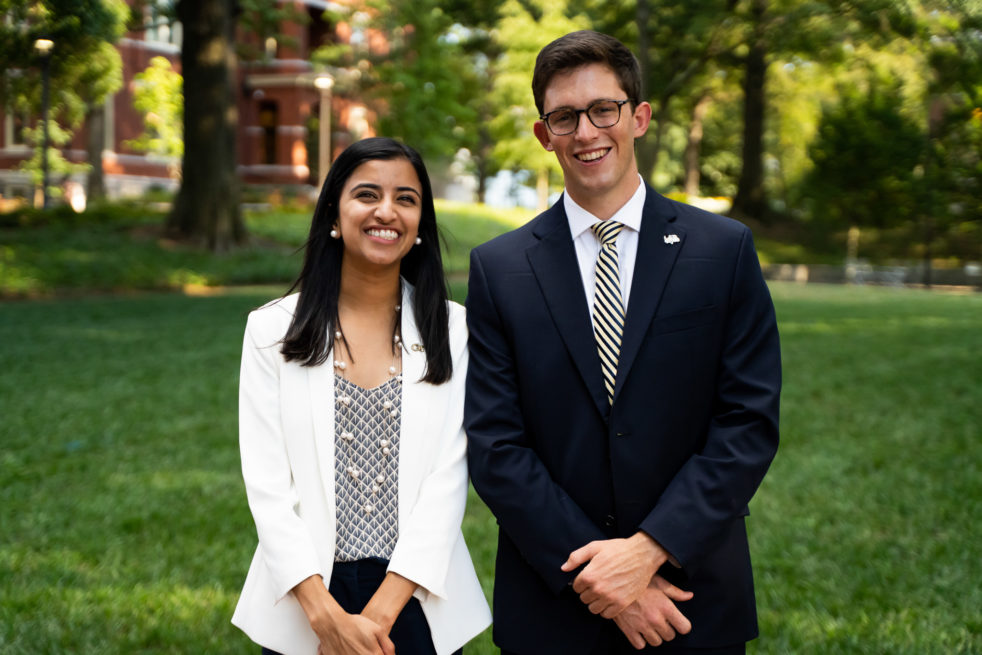The Technique sat down with the undergraduate Student Body President Pooja Juvekar, fourth-year IE, to reflect about the challenges and accomplishments of the Fall 2019 semester.
The Student Government Association had a lot of change to weather in the fall semester, including a new institute president and other administration turnover. The semester also came with its usual number of challenges: coaching students through changes to the community farmer’s market, advocating for the rights of undocumented college students, defending the campus from protesters who upsetted passers-by and fielding complaint after complaint about the ever-vilified parking and dining services.
In addition, with the unexpected challenges that had to be tackled when they arose, each member of SGA was working on projects they felt would better the Tech campus community. SGA recently released an executive review that summarized the work of each committee and board throughout the semester.
“It’s a good way for us to kind of pulse check during the middle of the year,” said Juvekar. “What did we say we were going to do, and how have we gotten there? If we haven’t gotten there, what are the projections for the spring? It’s something that I think is beneficial to give to the next administration.”
One of Juvekar’s chief concerns last semester was ensuring that all students remain informed and involved in SGA’s activities. The Information Technology Board began live streaming the Undergraduate House of Representative meetings, which take place on Tuesday nights, launched a new website and solicited student feedback on the Course Critique website.
The Communications Board launched the “What is SGA?” program, which connected with five organizations on how they can collaborate with student government. The Communications Board stepped up engagement on social media platforms such as Reddit and rebranded a monthly external newsletter.
SGA Chief of Staff Alice Francis, sixth-year ME, ensured that the student body stayed informed and involved in the various search committees and strategic planning sessions that took place last year. They participated in a search committee for the Executive Vice President of Administration and Finance, and led an External Advisory pilot program, which aims to ensure collaboration between students and Tech administration.
“We’ve really tried to prioritize as much as we can letting people know what SGA is doing,” said Juvekar. “Obviously there is great improvement we can have in what those communication metrics are and making sure that they are actually the most effective, but I think I’m proud of us for prioritizing that.”
Another of Juvekar’s concerns is that it is difficult to track the progress and impact of the numerous task forces, action teams and committees that are formed and dissolved in the attempt to better campus life. One of her goals before she graduates in December is to see the creation of some effort to track the progress of these organizations over the medium and long term.
Some of the most visible recent changes to campus life include several developments from the Board of Academic affairs. This team, led by third-year BME Brielle Lonsberry, oversaw the implementation of the minimester program, which included 14 courses and engaged 199 students. In addition, the board worked to identify the need to add mental health curriculum to the GT 1000 and GT 2000 classes.
The Student Life Board, led by Vice President Genny Kennedy, fourth-year INTA, also enacted many changes that can be spotted around campus. October saw the launching of the Menstrual Product Program, and dispensers for these products have been installed in several locations on campus. The Board created an Arts Committee to identify artistic opportunities and advocate for the necessity of the arts on campus. The Board designated meditation corners at different spots around campus, gauged student interest in electric buses and held several other discussions regarding campus concerns.
The Campus Services Board, led by Kathryn Otte, third-year IE, became the home of several new advisory boards. The Campus Safety Advisory Board, co-led by Juvekar, ensures the channels of communication between students, SGA, administration and the GTPD stay open and that any issues get addressed quickly. In addition, the Student Center Advisory Board has been communicating student opinions regarding the construction on the Student Center building.
Juvekar, who has now been student body president for just over half a year, reflected on her experience as president and said that it has been the best year of her life, despite the challenges it posed. Mainly, she says, she has attempted to keep a finger on the pulse of the student body and fight hard to make their voices heard.
“Speaking up for what you think is right and vocalizing your concerns is super pivotal. Students being informed of who their administrators are is pivotal. I think students being involved in the processes that govern Georgia Tech is pivotal,” said Juvekar. “I think there’s a level of civic engagement that I’ve learned in this role. I’m not a Public Policy major, but you don’t have to be to care about what’s going on in a policy sense around you.”
For more information about the work of these and other executive boards, visit https://tinyurl.com/udmz2n2.
